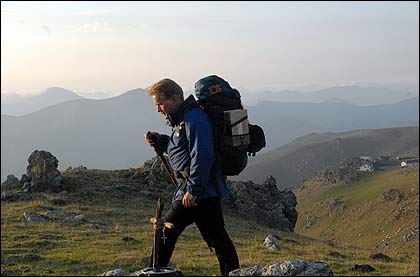
A Pilgrim’s Progress
Martin Sheen brings gravity, direction to The Way
THE WAY: Directed by Emilio Estevez. Written by Estevez, based on Jack Hitt’s book Off the Road: A Modern-Day Walk Down the Pilgrim’s Route. Cinematography, Juan Miguel Azpiroz. Editor, Raul Davalos. Music, Tyler Bates. Starring Martin Sheen, Emilio Estevez, Deborah Kara Unger, James Nesbitt, Yorick can Wageningen. Arc Entertainment, 2011. PG-13. 123 minutes. Three and a half stars.
 |
A well-to-do American widower — an ophthalmologist of mild but stern temperament, very set in his ways — is out golfing when he receives a call from Paris informing him that his only son has died while hiking the medieval trail from France to Spain’s Santiago de Compostella, a Christian pilgrimage also known as “the Way.” The father flies abroad to retrieve his son’s body, but once in France he decides to complete his son’s journey, spreading his ashes along the route. During the pilgrimage, this sheltered man’s spiritual blindness is cured by a series of encounters, and what began as a father’s duty ends in enlightenment and forgiveness.
This, minus a few idiosyncratic character sketches, is the rough outline of Emilio Estevez’s solid new film, entitled — innocently, arrogantly — The Way. The movie is as pat as it is predictable, like Rocky slurping Chicken Soup for the Soul.
As a filmmaker, Estevez’s ambitions far outpace his abilities, which is not to say he can’t make a perfectly watchable film (unlike Ron Howard, whose ambition overwhelms his intelligence at every turn). In fact, despite its hand-fed and occasionally ham-fisted symbolism — an eye doctor who can’t “see,” playing golf (“a good walk spoiled,” Twain joked), etc., etc. — and despite a few creaks and groans of shrink-wrapped sentimentality, The Way is a good film. It succeeds against nearly impossible odds, and overcomes its own obstacles on the way to, yes, inspiration.
Martin Sheen helps, of course. Martin Sheen always helps. Those same qualities that made Sheen such a plausible, seductively vulnerable U.S. president in Aaron Sorkin’s ‘90s television series The West Wing also, it turns out, make him a lovely travel companion; he is centered even when a mess, affable yet wry, intelligent, acerbic, charismatic and something of a human magnate, pulling the most off-kilter and interesting people into his immediate, albeit reluctant, orbit.
While Charlie Sheen was off “winning,” it appears Sheen’s other son, Estevez, was busying himself with the more modest fare of making movies, and casting his father as The Way’s Tom Avery (Estevez plays Avery’s dead son, Daniel, in flashbacks and daydreams) was a masterstroke.
Estevez, who also wrote the screenplay, adds some tasteful touches to an otherwise stock story of redemption. He is canny enough to leaven the spiritually fraught proceedings with moments of humor. The dialogue of the expatriate is depicted with precision and wit, as is the occasional fear that can flare when weary travelers encounter unfamiliar cultures. And Avery’s withdrawal from religious faith is treated with subtlety. When a priest asks Tom, kneeling in the chapel, if he’d like to pray with him, Sheen remarks bluntly, with rhetorical disgust: “What for?”
The Way does contain a sprinkling of cheese — a Gypsy conveniently named Ishmael, for instance — but for the most part, Estevez resists plucking every available heartstring. His real strength as a director is economy and clarity.
In the end, however, The Way is Martin Sheen’s film, and he carries it expertly with every step. Even at this relatively late stage in his career, he remains one of our most recognizable but underrated actors, inhabiting that twilit category (i.e., no Oscar) that once boasted names like Eastwood and Bridges. There has always been something existentially compelling about Sheen — an essential American-ness — that naturally draws him to films about journeys.
In movies like Apocalypse Now and especially Terrence Malick’s Badlands, Sheen embodied the kind of prideful, reckless abandon of the innocent that so defines this country, be it the Vietnam commander sent into insanity’s heart of darkness or the romantic nihilist hitting the road in the name of love, murder and celebrity. Behind those piercing eyes and warm good looks, now grown a bit jowly, there hides a hunger for what can only be called purity and truth. In The Way, Sheen — a tangle of hurt and yearning — brings this mysterious hunger front and center, where it growls with paternal obligation and need. It’s a great performance that may, at long last, bump him into a higher realm of recognition, where he belongs.
The Way opens Dec. 2 at Bijou Cinemas; info & times at bijou.com